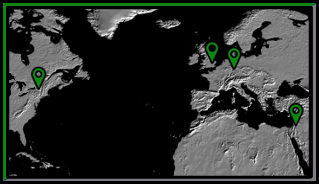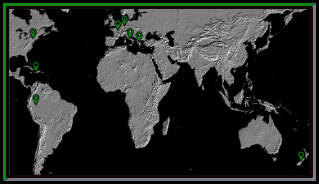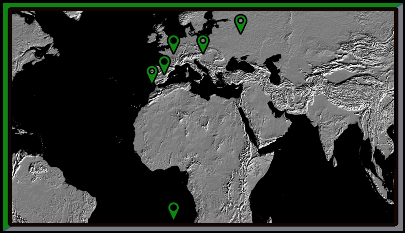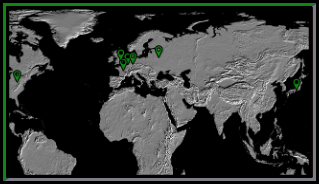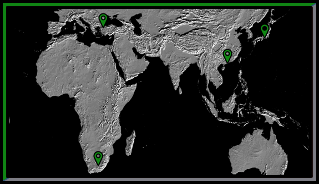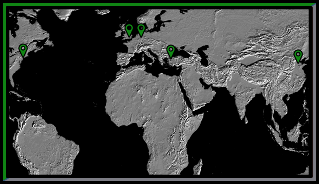-
American History
- American History Honors >
- Unit 0: 1763 - 1800 - Revolutionary America
- Unit 1: 1800 - 1848 - Expansion & Reform
- Unit 2: 1848 - 1877 - A Nation Divided
- Unit 3: 1865 - 1898 - The Gilded Age
- Unit 4: 1890 - 1920 - American World Debut
- Unit 5: 1920 - 1945 - Trials and Tribulations
- Unit 6: 1945 - 1963 - Cold War Tensions
- Unit 7: 1955 - 1980 - Conflicts & Resolutions
- Unit 8: 1980 - present - Modern America
-
World History
- World History Honors
- Unit 1: (1200-1450) - State Building in the Global Tapestry
- Unit 2: (1200-1450) - Networks of Exchange
- Unit 3: (1450-1750) - Land-Based Empires
- Unit 4: (1450-1750) - Sea of Exploration
- Unit 5: (1750-1900) - Revolutions
- Unit 6: (1750-1900) - Imperial Migration
- Unit 7: (1900-present) - Global Conflicts
- Unit 8: (1900-present) - Cold War & Decolonization
- Unit 9: (1900-present) - Globalization
-
Advanced Placement (AP)
-
AP World History
>
- Unit 1: (1200-1450) - State Building in the Global Tapestry
- Unit 2: (1200-1450) - Networks of Exchange
- Unit 3: (1450-1750) - Land-Based Empires
- Unit 4: (1450-1750) - Transoceanic Interconnections
- Unit 5: (1750-1900) - Revolutions
- Unit 6: (1750-1900) - Imperial Migration
- Unit 7: (1900-present) - Global Conflicts
- Unit 8: (1900-present) - Cold War & Decolonization
- Unit 9: (1900-present) - Globalization
-
AP European History
>
- Unit I - The Rise of Europe
- Unit II - Rebirth and Exploration
- Unit III - A Fractured Faith
- Unit IV - A Question of Sovereignty
- Unit V - A Shifting Society
- Unit VI - Revolution
- Unit VII - Political Turmoil
- Unit VIII - Rise of the Nation-State
- Unit IX - Forging the Modern Era
- Unit X - Imperialism and the Great War
- Unit XI - Global Conflicts
- Unit XII - The Long Peace
-
AP World History
>
- Civic Literacy
|
NEED TO KNOW
|
For over a millennium, the world accepted the view of a finite universe being unchanging and all knowledge made available through religious teachings. However, the Renaissance, Age of Exploration, and Reformation challenged these views of the world forcing people to reexamine everything they thought they knew.
|
|
NEED TO KNOW
|
As Enlightenment ideas developed, they spread throughout Europe and across the Atlantic with tremendous political consequences. The political effects of the Enlightenment sparked revolutions and ignited nationalist fervor in every region where it was introduced in an attempt to create better and more enlightened societies.
|
|
NEED TO KNOW
|
The young general takes charge following the French Revolution as he spreads the ideals of the revolution and the Enlightenment to other parts of Europe.
|
|
NEED TO KNOW
|
The period from 1750-1900 saw a dramatic change in the socioeconomic conditions of the world as merchant economies and societies based on agrarian trade fell to industrial economies and societies based on industry and manufacturing, changing the world more than any other event in history.
|
|
NEED TO KNOW
|
As the Industrial Revolution grew into a global phenomenon that abandoned mercantilism for capitalism, the influence of western society came with it as some countries embraced this new reality to gain wealth and power while others were resistant to western-influenced industry choosing to preserve traditional values and culture.
|
|
NEED TO KNOW
|
The Industrial Revolution brought about extensive change to those nations that embraced it leading to higher standards of living for many, but it was not without flaws that provided for the growing inhumanity of industrial work that saw few prosper at the expense of the many. In response, many reacted and sought a change to the growing changes of industry.
|
-
American History
- American History Honors >
- Unit 0: 1763 - 1800 - Revolutionary America
- Unit 1: 1800 - 1848 - Expansion & Reform
- Unit 2: 1848 - 1877 - A Nation Divided
- Unit 3: 1865 - 1898 - The Gilded Age
- Unit 4: 1890 - 1920 - American World Debut
- Unit 5: 1920 - 1945 - Trials and Tribulations
- Unit 6: 1945 - 1963 - Cold War Tensions
- Unit 7: 1955 - 1980 - Conflicts & Resolutions
- Unit 8: 1980 - present - Modern America
-
World History
- World History Honors
- Unit 1: (1200-1450) - State Building in the Global Tapestry
- Unit 2: (1200-1450) - Networks of Exchange
- Unit 3: (1450-1750) - Land-Based Empires
- Unit 4: (1450-1750) - Sea of Exploration
- Unit 5: (1750-1900) - Revolutions
- Unit 6: (1750-1900) - Imperial Migration
- Unit 7: (1900-present) - Global Conflicts
- Unit 8: (1900-present) - Cold War & Decolonization
- Unit 9: (1900-present) - Globalization
-
Advanced Placement (AP)
-
AP World History
>
- Unit 1: (1200-1450) - State Building in the Global Tapestry
- Unit 2: (1200-1450) - Networks of Exchange
- Unit 3: (1450-1750) - Land-Based Empires
- Unit 4: (1450-1750) - Transoceanic Interconnections
- Unit 5: (1750-1900) - Revolutions
- Unit 6: (1750-1900) - Imperial Migration
- Unit 7: (1900-present) - Global Conflicts
- Unit 8: (1900-present) - Cold War & Decolonization
- Unit 9: (1900-present) - Globalization
-
AP European History
>
- Unit I - The Rise of Europe
- Unit II - Rebirth and Exploration
- Unit III - A Fractured Faith
- Unit IV - A Question of Sovereignty
- Unit V - A Shifting Society
- Unit VI - Revolution
- Unit VII - Political Turmoil
- Unit VIII - Rise of the Nation-State
- Unit IX - Forging the Modern Era
- Unit X - Imperialism and the Great War
- Unit XI - Global Conflicts
- Unit XII - The Long Peace
-
AP World History
>
- Civic Literacy









